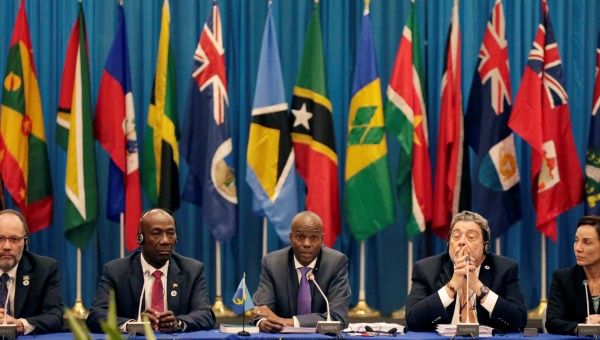CARICOM maintains ‘Non-Intervention, Non-Interference’ policy on Venezuela
By Edu Montesanti From TeleSUR
The Caribbean Community (CARICOM) has firmly rejected international intervention in Venezuela and said the 15 nations, which form the organization, would maintain its current relations with the South American country. The statements come following the end of CARICOM’s 29th Inter-sessional meeting in Haiti, which ended on Wednesday.
Speaking at the closing press conference for the heads of government on Ralph Gonsalves, the Prime Minister of Saint Vincent and the Grenadines, reiterated the community’s non-intervention position on the Bolivarian country’s internal affairs.
Gonsalves said: “Caricom’s position on Venezuela… is well established at several (past) meetings of Caricom, and the principles have been enunciated in relation to non-intervention and non-interference,” he added that it was in the Caribbean’s interest to work toward “strengthening and supporting” the principles of representative democracy and freedom in Venezuela.
Gonsalves’ statements were supported by Dr. Keith Rowley, the Prime Minister of Trinidad and Tobago, who said that his country had responded well to the increased of Venezuelans to its shores. He added that many of the persons, who have arrived were looking for job and trade opportunities due to the impact of United States-led sanctions and Trinidad and Tobago would do what it could to improve trade relations with its South American neighbor.
Venezuela’s Vice Minister for the Caribbean in the Ministry of Popular Power for Foreign Affairs, Raul Licausi, thanked the grouping for their support.
In a press statement issued on Wednesday, he said the Caribbean countries: “have stood firmly on their stance despite constant pressures from international factors, showing that dignity in the Caribbean is exemplary.”
In relation to the invitation the National Electoral Council (CNE) made for Caricom to send an accompanying electoral mission for April 22 presidential elections, Licausi said they have “full confidence” in their electoral system and hope the Caricom can be present in the “pre and post-electoral phases, in both the technical and political levels.”
He added: “One of the most important messages we received for the people and the revolutionary government is that of solidarity and respect towards the Bolivarian Republic of Venezuela’s internal affairs.”
The Caribbean Peace Movement (CPM), which including several individuals and organizations from the Caribbean, applauded Caricom’s non-interference stance on Venezuela and their self-determination and development rights, especially the actions of the leaders of Saint Vincent and the Grenadines, Dominica, and Suriname for their votes supporting Venezuela at the OAS.
In a letter directed to Caricom’s head of states, the CPM regretted that some Caribbean countries didn’t agree on this.
“Unfortunately, at the recently held Organization of American States (OAS) meeting in Washington DC, some of our CARICOM member states –specifically Jamaica, St. Lucia, Barbados, the Bahamas and Guyana — chose to abandon the principles of collective leadership enshrined in the foundational document of the Treaty of Chaguaramas which have historically guided CARICOM’s foreign policy positions in relation to other countries,” the letter reads.
Haitian President and Caricom’s Chairman Jovenel Moise declared that the organization should remain a shared space where the Caribbean nations can defend their interests.
For more on this story go to: https://www.telesurtv.net/english/news/Caricom-Reaffirms-Non-Intervention-Policy-on-Venezuela-20180301-0009.html






